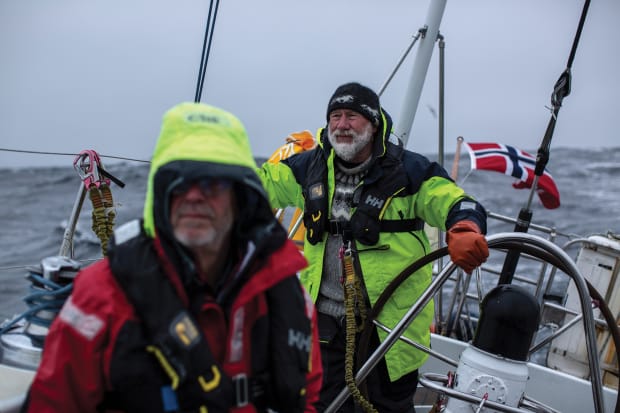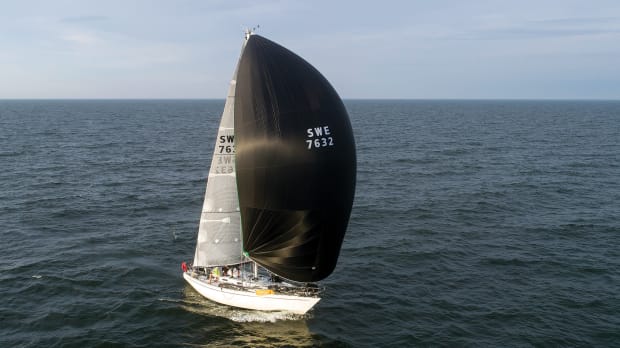
Photo courtesy of James Austrums
I don’t like sea stories. My number one goal on every passage is to get the crew back in one piece. My number two goal is to get the boat back in one piece as well. If I can’t do both, I’ll take the former. Do this long enough, though, and things are going to happen, no matter how much you preach and practice good seamanship.
THE DEBRIEF
Since hiring a few new skippers and mates to run our offshore programs as Mia and I grow our charter company 59º North to three boats—and since the birth of our son, Axel, in 2020—we’ve developed a standard passage debrief form that is completed immediately after each trip by the skipper and mate while it’s still fresh in their minds. Parts of it are standardized to allow us to easily compare the relative success of one passage to another: like how we rate each trip, subjectively, on a scale of 1 to 100, factoring in the degree of difficulty that went along with it, along with crew dynamics, weather, time of year, external factors, etc. However, there’s also a section that allows us to debrief the things that went right and wrong and then think critically about them.
Crucial to a good debrief is identifying the crux of why something went sideways. Even more difficult, and equally important, is identifying why something went right. Was it good decision making? Was it luck? And how do you tell the difference?
FIRE DOWN BELOW
Sometimes it’s easy to tell the difference. Onboard Spica, the 1977 Norlin 34 that Mia and I bought as our family boat, we managed to set the galley on fire during a recent 350-mile Gotland Runt race.
We were a crew of six, all friends. One of our shipmates, Steve, was trying to fill the oven burner with alcohol and had asked me to confirm he was filling it in the right place. I was on watch and distracted. When I give it a quick glance it looked right to me. Five minutes later I said to Steve, “Damn, that oven is hot!” In fact, it was on fire!
In no time, the flames coming up from below and behind the stove were reaching as high as the deckhead. I could feel the heat from the nav desck on the opposite side of the boat. We had just rounded a mark close inshore at Visby, Sweden, and had the spinnaker up, going fast in a good breeze. For a split second I wondered whether you could put out an alcohol fire with water. However, I wasn’t sure, so I grabbed the big fire extinguisher out of the forepeak. One quick blast had the fire out, though the powdered chemicals also created an enormous mess.
At the heart of this incident was my distraction in the moments before it happened, that and lack of preparation. This was obvious, hardly even requiring a debrief. Knowing we were going to be heating up all the meals in the alcohol oven, we should have 1) pre-filled the burners at the dock before the race start, and 2) all known exactly how to fill them.
A nice bonus would have been outfitting Spica with foam extinguishers, which create way less mess when you use them. But hey, at least we had extinguishers.

Photo by Andy Schell
IS IT LUCK?
Again, more difficult is debriefing why things go right, when a passage happens without any good “sea stories.” How do you define where on the spectrum you draw the line between luck and skill?
I’m most proud of our expedition to Svalbard in the summer of 2018 on our Swan 48 Isbjørn as an example of how we did things right. It’s a longer story for another article, but briefly, I took nothing for granted and spent an entire year preparing—even longer, if you start the timer in 2014 when I first hung charts of Spitsbergen on the wall of my office when we lived in Pennsylvania! I talked to and met with people who had sailed there before on their own boats. We took Isbjørn to a major boatyard in Sweden for a six-month refit over the winter, making sure to preemptively address any problems we might have. Mia and I even went to Iceland to join a ski and sail expedition with some friends who run a charter business there called Aurora Arktika to get a taste of cold weather sailing in remote places. We set the schedule so as to be sailing in the Arctic during the “right” season, and made sure to be out of Iceland by mid-August, when the fall gales start to arrive. The result was a great summer with a whole lot of positive experiences and no “sailing stories.” The crux of our successful summer, and really the crux of any great offshore passage, comes down, as always, to preparation.
EXTERNAL CONTRIBUTING FACTORS
Often overlooked, and something we’ve borrowed from the world of aviation is the way external factors can lead to bad outcomes. In our debrief forms, we ask questions like “How stressed, on a level of 1-10, were you prior to crew arriving?” “Were deadlines realistic?” “Did you have enough time to prepare the boat between trips?”
Emotional factors like leaving Axel, who was 16 months old at the time, and Mia behind for the first time in November 2020 played a huge role in my stress level before departing for a 1,400-mile passage south to Antigua. Covid only made things that much worse. Those factors almost certainly clouded my judgment at sea, and Emma, my first mate on that trip, and I discussed them before leaving so as to be on the lookout.
Our debrief also asks questions about how much sleep skippers and mates are getting. “Did the skipper and mate get sufficient rest to be their ‘best selves’ and operate the boat safely? If not, why not and what can you do next time to ensure it? If yes, what was the key to getting the right amount of rest.”
One of the things I learned from interviewing Vendée Globe and Volvo Ocean Race skipper Dee Caffari is how important it is for to her to be rested and fed before making any major decisions. She’s learned through experience it’s the only way she can ensure she’s thinking clearly. As for the weather, we debrief that too. “Where were the potential turning points in the weather decisions regarding routing?”
Perhaps most importantly, we have a “Close Calls” section of the debrief, in which we ask the professional crew to list any instances where something almost happened, but didn’t, and why. “How good were the skipper and mate about setting good examples with PFDs and tethers?” “How good were the crew at following it?” “Were there any close calls, like MOBs, injuries, etc.? If so, how/why were they avoided—action or luck?” “How did crew handle winches, move around on deck, etc.?” “Did crew log their seasickness medication? Any medical issues we need to know about?”
THE DANGER OF EXPERIENCE
Perhaps the single worst side effect of “experience” is complacency. I’ve long since lost track of how many miles I’ve covered since we started 59º North in 2015. And while it would be easy to pat myself on the back and keep going through the motions, I know how dangerous that can be.
Paradoxically, the more experience we gain, the more diligent we must be in constantly evaluating that experience, learning from even the best outcomes and continuing to tweak the systems that got us safely through all those sea miles in the first place.
Andy Schell co-founded and runs 59 North Sailing with his wife, Mia Karlsson, offering offshore sailing adventures on their Swan 48 Isbjørn, Swan 59 Icebear and Farr 65 Falken. They and their son, Axel, live in Sweden and sail Spica in their home waters off Stockholm. Visit 59-north.com for more information.
September 2022








